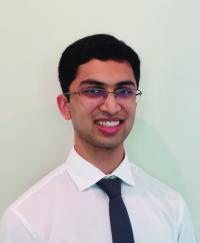Ophthalmic Technician Aman Kapoor
Winter
2024
Feature
Ophthalmic Technician Aman Kapoor
Aman Kapoor
C2 - Kapoor headshot.jpg

Aman Kapoor.
As an ophthalmic technician, I serve as an intermediary between patients and doctors. I’m the first person to meet a patient entering our clinic. I find out what issues they're concerned about, what symptoms they have, and other information and write a full History of Present Illness (HPI) for the doctor to review. I then run tests based on the patient’s HPI. I assess their visual acuity, measure intraocular pressure and corneal thickness, do refractions to find their prescription, and more. I also conduct visual field tests and take OCT (optical coherence tomography) scans of the patient’s retinas.
Some of the best parts of the job are also what make it challenging: Thinking on your feet, answering tough questions, and collaborating with technicians and doctors to make the right decisions. Some patients need routine vision and pressure checks, and their requirements are fairly straightforward. But others come in for vision issues that have just started, and you have to decide what tests to do based on their symptoms. This process takes some time getting used to, and it requires knowing when to seek advice from senior technicians or doctors. Another awesome part of the job is the amount of learning involved. We spend a great deal of time training in both clinical skills and the pathophysiology behind the conditions we manage, including glaucoma, keratoconus, and cataracts. I’ve also learned about the biological mechanisms by which the medications we prescribe exert their effects.
In this job, it helps to enjoy interacting with people. You might meet someone who went to the same school as you growing up, as well as people with all sorts of funny stories. But there’s also a responsibility that comes with knowing a patient’s health is partly in your hands. While doctors check your work and ultimately make the decisions, it’s important to take care when working with a patient. For instance, you must be extremely careful measuring vision or pressures, and it’s essential to note a detailed patient history so that a safe and effective treatment plan can be created. We're trained to be thorough and ask questions so that we can do the best for our patients.
While physics is a less common choice for premed, it seemed pretty natural to me. A lot of diagnostic technology (MRI, CT, PET, OCT, etc.) was developed by physicists. Even much of the physiology in medicine can be broken down into physics. For example, ophthalmology involves a ton of physics applications, from the geometric optics of lenses to hydrostatic pressures of the eye in glaucoma. Cardiology relies on a solid understanding of fluid mechanics to understand blood flow, and of electricity and magnetism (E&M) to understand how the heart pumps.
Both physicians and physicists are problem solvers. While physicists think critically to solve problems in modeling the universe, physicians think critically to solve problems diagnosing and treating complex pathologies. The time I spent working on challenging physics problem sets gave me good problem-solving skills that I can build on throughout my medical journey.
I encourage premed physics undergraduates to study hard, do well in their courses, and look for the connections to physics in their premed classes—the electron transport chain that you learn about in biochemistry has a huge connection to quantum tunneling. In physiology, action potentials and the way neurons fire can be understood by E&M and circuit theory. Also, spend time outside of class working with people, whether at a senior home, tutoring center, or hospital. Even spending more time with your family and listening to their stories can be rewarding in many ways.
Don’t be afraid to choose something nontraditional. Physics plays a role in everything and will prepare you for anything you do.
